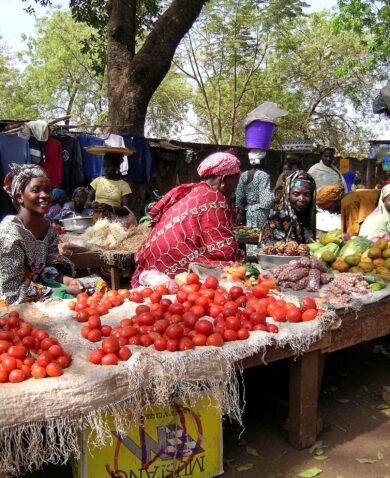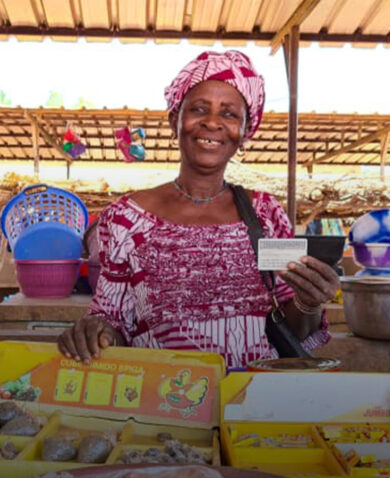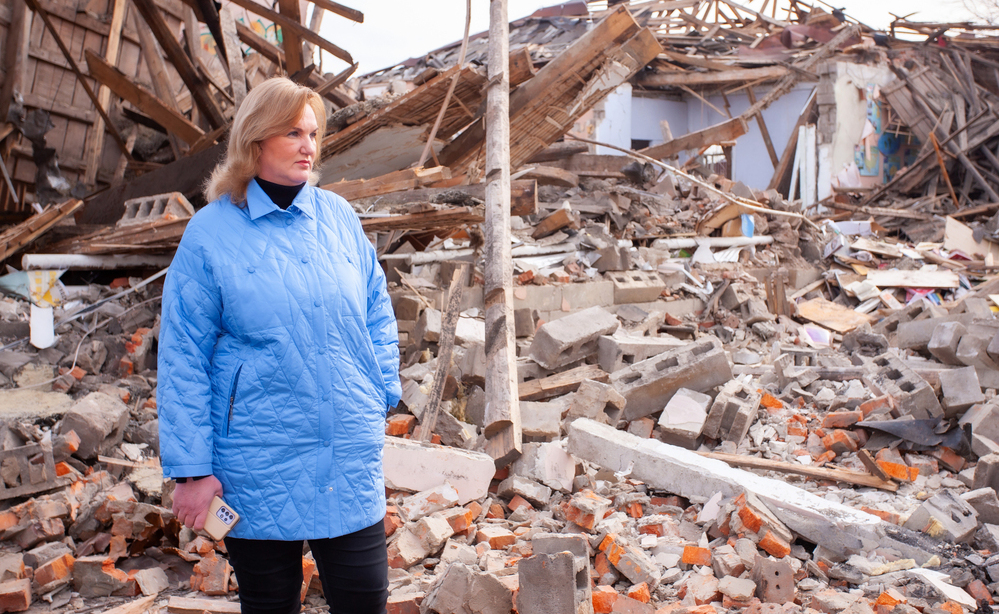
Ukraine’s Women Leaders Transforming Communities Amidst War
March 7, 2024 | 5 Minute ReadTwo years on since the Russian full-scale invasion of Ukraine, Chemonics UK is honouring Ukraine’s women leaders this International Women’s Day.
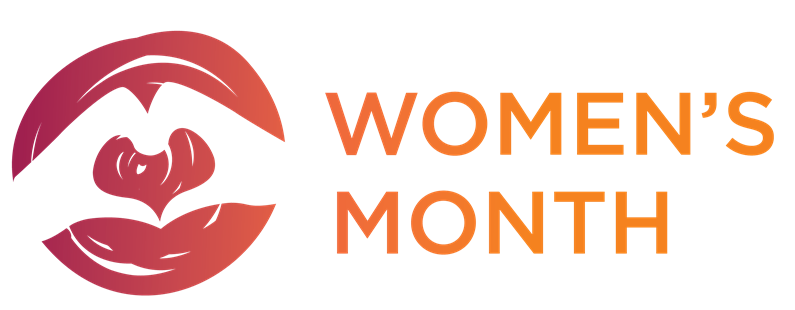
As this year’s International Women’s Day theme is Inspire Inclusion, Chemonics UK is focusing on the transformative and inclusive community recovery that community leaders are implementing across Ukraine, with the support of programmes such as the Partnership Fund for a Resilient Ukraine (PFRU). Chemonics UK’s PFRU programme is a multi-year, multi-donor funded programme managed by the UK’s Foreign, Commonwealth and Development Office (FCDO) and governed in collaboration with the Government of Ukraine.
Since Russia’s full-scale invasion of Ukraine on 24 February 2022, there have been over 30,000 civilian causalities, whilst nearly 3.7 million people are internally displaced. There has been collective resilience and courage from all Ukrainian men, women, and children, both inside and outside of Ukraine, who are suffering the consequences of war. In particular, two Ukrainian women leaders have showcased great leadership and strength in the face of war – Halyna Minayeva and Olha Poliova.
Inclusive community recovery
The Russian war against Ukraine ruined many communities around Ukraine, with most of the human and infrastructure losses being felt in the Eastern and Southern regions of Ukraine.
One of the cities that found itself on the frontline was Chuhuiv in the Kharkiv region of Ukraine. With its close proximity to the Russian border, it immediately came under attack. The people of Chuhuiv lived under daily shelling for almost six months until Ukrainian Armed Forces were able to resist the Russian offensive away from the city.
But amidst the explosions, burning high-rise buildings and fear, one woman’s leadership prevailed. Halyna Minayeva is the mayor of Chuhuiv and has been the city’s mayor since 2002, having been reelected five times. Halyna was instrumental in organising food and medical supply to Chuhuiv’s residents when the invasion began, which was made even more challenging with the city being on the frontline and under constant bombardment. And following the massive counter-offensive in the Kharkiv region in September of 2022, Halyna has played a significant role in the city’s rebuilding process.
“We will definitely rebuild everything that the enemy has destroyed. The tragedy is that 38 civilians in our community were killed. They will never come back…”
Nearly 6.5 million Ukrainians have left the country since the start of the war, becoming refugees. Some are gradually coming back to Ukraine or back to their communities from other parts of the country. Halyna knows that safety is crucial for women returning home. She also knows that other factors such as employment and social infrastructure (kindergartens and schools) are key for women, with Halyna’s approach to rebuilding being both practical and inclusive. And to ensure the holistic rehabilitation of children with disabilities, Halyna and the Early Recovery component of the PFRU programme are working on reconstruction and strengthening services for children with mental health disorders. She wants to expand the services for children to help them integrate into community life and become self-dependent.
Inclusive community recovery will be the answer to building a new Ukraine where everyone can live with dignity. Halyna knows that women play a key role in recovering Ukraine – she highlights their growing participation in the economy, including industry and municipal services, since the start of the current phase of the war. Nonetheless, the daunting task to empower the women of Ukraine and encourage them to return home to their communities remains. And, leaving no one behind is a core principle for the PFRU programme in community recovery.
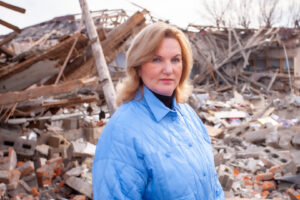
Halyna Minayeva in front of a building’s destruction in Chuhuiv city in the Kharkiv region of Ukraine.
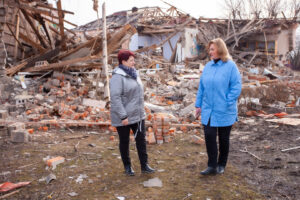
Halyna Minayeva and her colleague.
Creating safe spaces for the most vulnerable
The town of Izyum in Kharkiv oblast was under Russian occupation for more than six months and, once liberated, became infamous globally due to the discovery of a mass burial site with 440 graves of civilians, some with signs of torture.
Olha Poliova had been a kindergarten director in the town since 2001, having been a teacher and methodist for three years prior. When Russia’s full-scale invasion started, Olha, like many other residents of her town, had to live in the basement of her home with no access to light, heating, or running water because of the constant shelling and bombardment of civilian infrastructure.
Despite the full occupation of her town and the personal danger she may encounter, Olha took the brave decision to visit her beloved kindergarten. She crossed the Siverskyi Donets river using an almost destroyed bridge and walked through the abandoned streets that had once been busy with her neighbours, friends, and colleagues. She recalls how the only sound she heard was the crunch of glass under her feet. She found her kindergarten still intact, but with almost 250 people who had sought shelter in the basement. Later, however, shells landed near the building shattering windows, doors and breaking the roof. The heating and water supply systems also did not function.
Following the city’s liberation in September 2022, Olha started working on restoring the kindergarten so that it could resume its crucial function. She now aims to create a safe space for 140 of the youngest – and most vulnerable – members of the Izyum community. The Early Recovery component of the PFRU programme is actively supporting Olha’s plans to build a shelter for children that allows them to hide during Russian missile attacks that are happening in Kharkiv region almost daily. This shelter will also serve as a community centre to support parents’ mental health. Moreover, the parents can finally have access to a safe space for their children, whilst they return to work to support their families and communities as recovery across Ukraine continues. Olha’s plans do not stop here – she also plans to launch yoga and art classes to support mothers and their mental health.
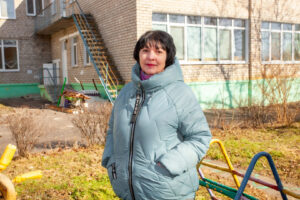
Olha Poliova in front of the kindergarten in Izyum town in Kharkiv oblast.
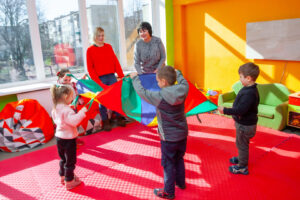
Olha Poliova and her colleague with some of the children who attend the kindergarten.
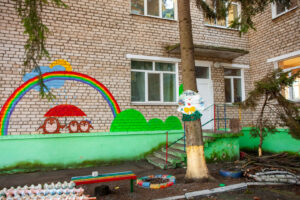
The kindergarten.
Rebuilding to a more resilient and prosperous Ukraine
The PFRU programme supports initiatives that integrate trauma-informed approaches and provide activities for community stabilisation and development. Embedding women’s voices in decision making, planning, and implementing will accelerate and advance Ukraine’s inclusive recovery and community transformations.
The aim of the PFRU programme is to set improved conditions for the Ukrainian state, in partnership with civil society and the private sector, to lead on inclusive national recovery and revitalisation in the context of Russia’s aggression. This outcome is designed to facilitate the rebuilding of a more resilient, socially cohesive, inclusive, independent, democratic, sovereign, and prosperous Ukraine. The PFRU provides funds to Ukrainian and international delivery partners and implements projects based on research and evidence.
Banner image caption: Halyna Minayeva stands in front of a building’s destruction in Chuhuiv city in the Kharkiv region of Ukraine. Photo taken by the PFRU team in Ukraine.
Posts on the blog represent the views of the authors and do not necessarily represent the views of Chemonics.





